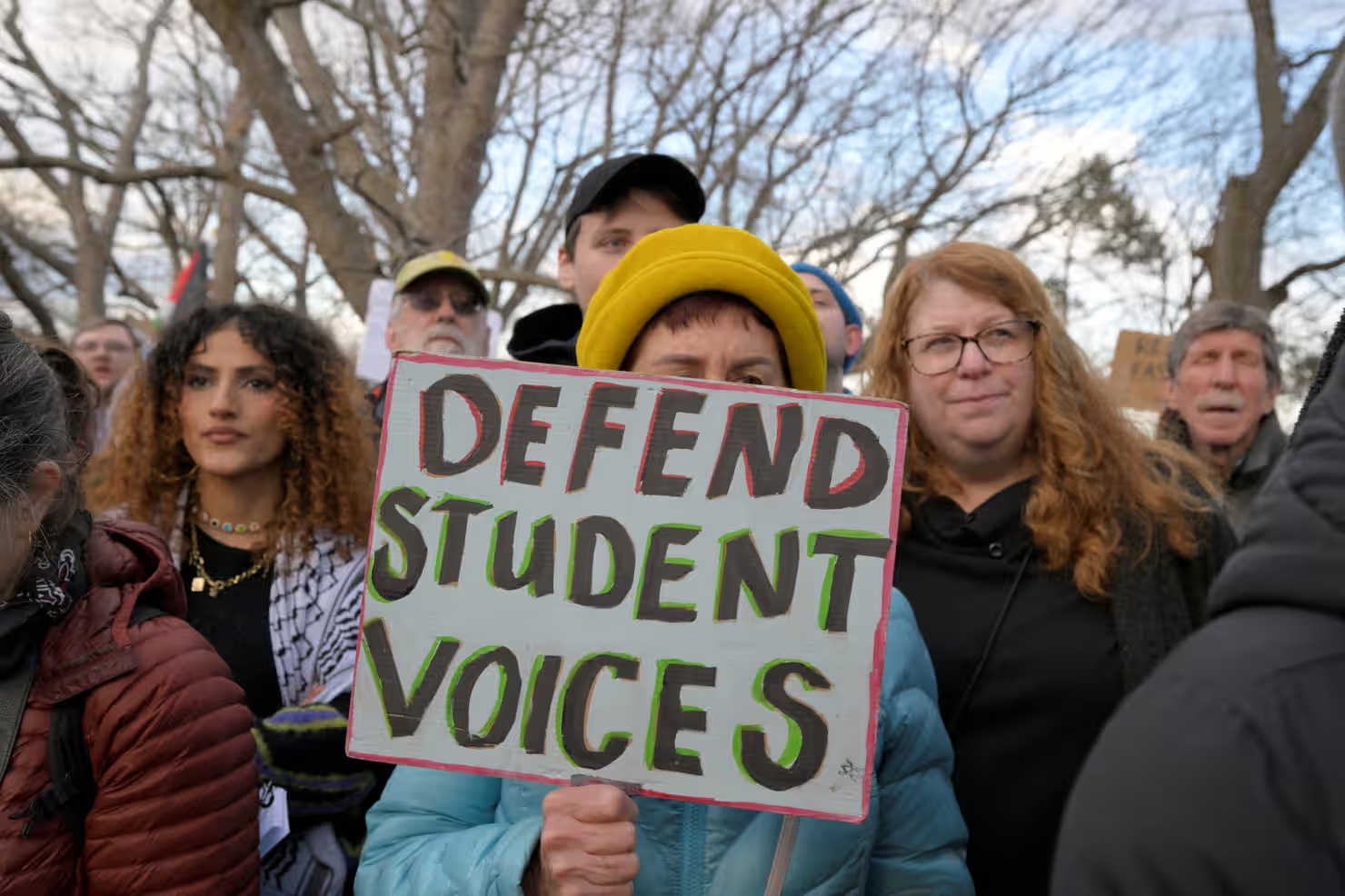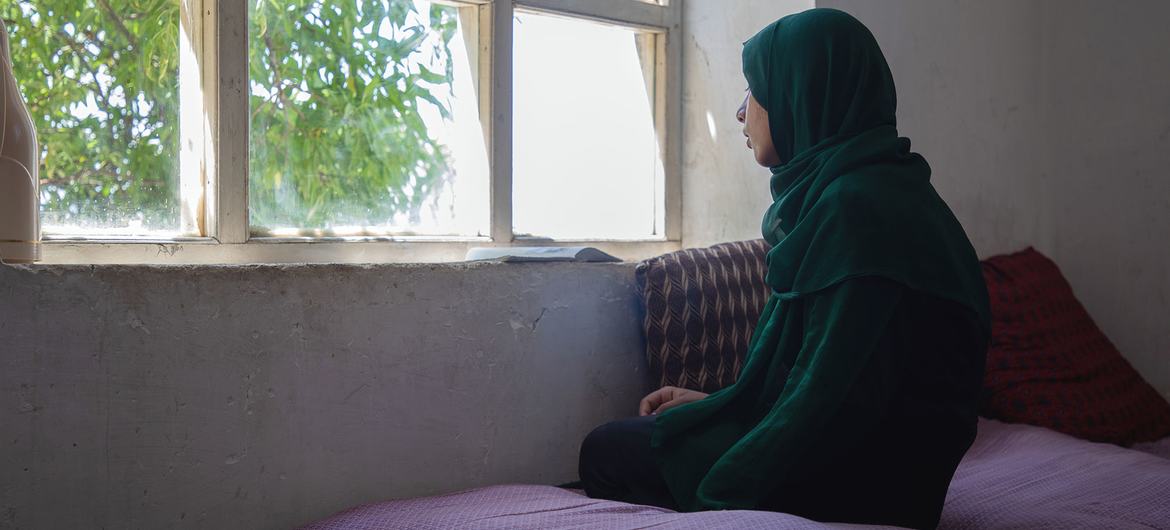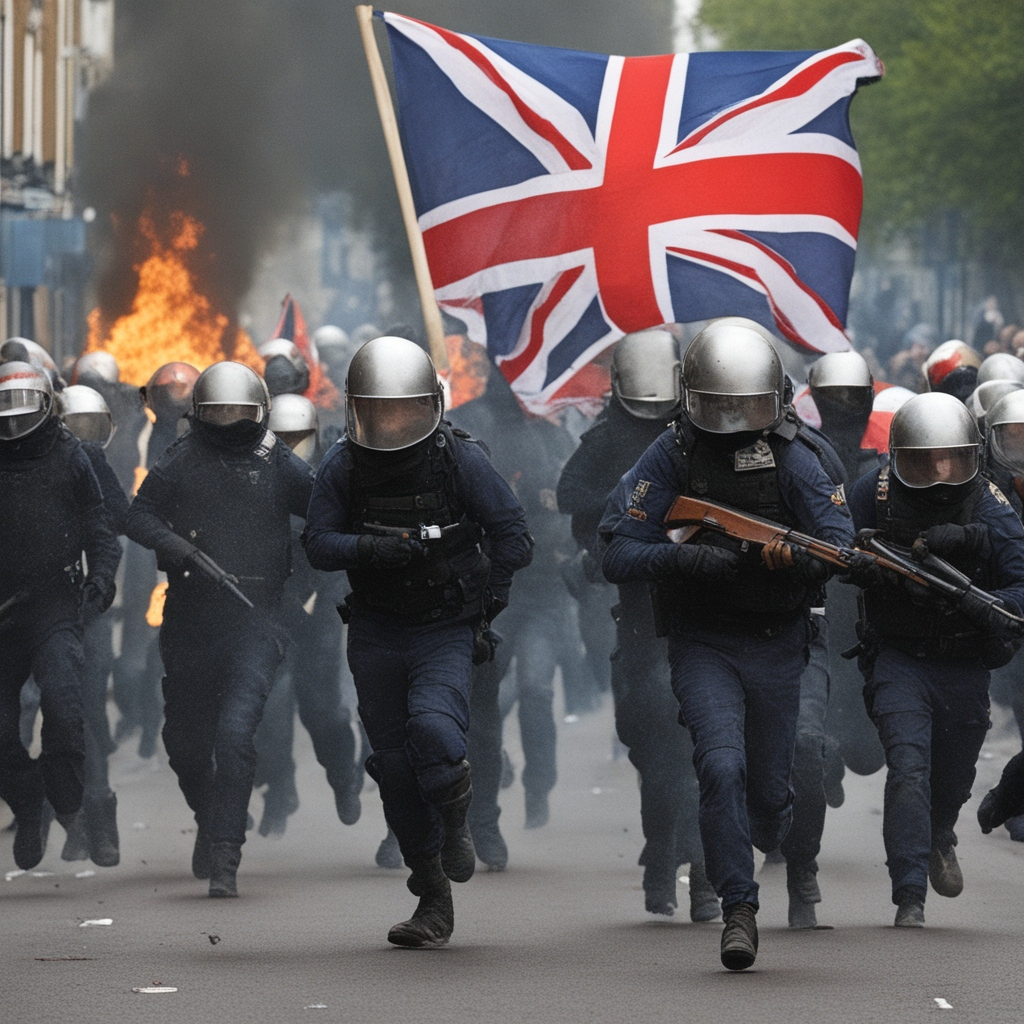Averi Aya-ay, Associate Member, Immigration and Human Rights Law Review

I. Introduction
On May 14, 2024, President Donald Trump stated at a private campaign event that if any international or non-citizen student participated in protests, the government would “throw them out of the country.”[1] President Trump asserted that the threat of deportation would compel these students “to behave.”[2] He made these statements against the backdrop of the ongoing war between Israel and Palestine and the surge of pro-Palestinian protests on college campuses across the United States.[3]
Whether noncitizens have First Amendment rights, particularly the rights to free speech and assembly, remains a controversial issue.[4] The Supreme Court has not issued a definitive ruling on the matter.[5] This lack of clarity has allowed the Trump administration to implement a policy permitting the deportation of international students who participate in pro-Palestine protests.[6] While the Supreme Court has not addressed the issue of noncitizens’ rights, a district court has been forced to weigh in on this issue in American Association of University Professors v. Rubio. This case followed the widely reported deportation of Mahmoud Khalil, a recent Columbia University graduate who participated in such protests on campus.[7]
This blog examines the historical and current legal framework governing the rights to free speech and assembly for noncitizens under both U.S. law and international law. Then, it discusses American Association of University Professors v. Rubio and explores its potential implications for non-citizens’ civil liberties. Finally, the blog concludes by advocating for First Amendment protections for all individuals within the United States, including noncitizens, by limiting the government’s ability to use immigration enforcement to suppress political expression, particularly in academic settings, where such rights are fundamental to intellectual freedom.
II. Background
This section explores the constitutional limits of government authority to restrict noncitizens’ speech and assembly, focusing on the tension between immigration enforcement and First Amendment protections. While noncitizens possess limited free speech rights under the First Amendment and Due Process Clause, courts have historically deferred to national security and sovereignty concerns.
A. Freedoms of Speech and Assembly for Noncitizens in the United States
The First Amendment prohibits Congress from establishing religion, restricting its free exercise, limiting freedom of speech or the press, or preventing peaceful assembly and petitioning of the government.[8] In Kleindienst v. Mandel, the Supreme Court acknowledged that noncitizens possess certain First Amendment rights, including freedom of speech.[9] However, these rights are not as expansive as those afforded to U.S. citizens, especially when noncitizens are outside the United States.[10] Still, the Supreme Court noted that restricting noncitizens’ speech may infringe on the First Amendment rights of U.S. citizens, especially their right to receive information.[11] In contrast, the Court has also noted that the Due Process Clause of the Constitution protects freedom of speech and assembly as “of personal liberty secured to all persons,” regardless of citizenship.[12] These principles reveal a tension in the Supreme Court’s approach. While the Court has recognized that noncitizens may have First Amendment rights, it has also upheld the government’s broad authority to restrict those rights, especially when noncitizens are outside U.S. borders.[13] This inconsistency reflects the Court’s struggle to balance national sovereignty and immigration control with constitutional protections of free speech and individual liberty.
The United States has a long history of invoking national security and anti-terrorism justifications to restrict the speech of noncitizens.[14] This pattern dates back to the Alien and Sedition Acts of 1798, which criminalized speech defamatory toward the government.[15] The Act granted the President broad authority to deport noncitizens without trial if considered a threat.[16] Recently, the USA PATRIOT Act of 2001 allowed the deportation of individuals who fundraised for or provided support to organizations designated as terrorist groups by the U.S. government.[17]
B. American Association of University Professors v. Rubio
The American Association of University Professors (AAUP) sued the government in response to the Trump administration’s announcement of plans to implement large-scale detentions and deportations of noncitizens who participate in pro-Palestinian protests.[18] The AAUP’s complaint refers to this policy, which is rooted in Executive Orders No. 14,161 and No. 14,188, as the “ideological-deportation policy.”[19] These orders target noncitizens who “espouse hateful ideology” or are deemed antisemitic.[20]
In this case, Mahmoud Khalil, a recent Columbia graduate and lawful permanent resident, was arrested, and at least four other students had their visas revoked for participating in pro-Palestine protests.[21] The AAUP alleges that the “ideological deportation” policy violates the First Amendment by enabling the government to deport noncitizen students and faculty based on their viewpoints.[22] They argue that this policy infringes on noncitizens’ First Amendment rights as well as U.S. citizens’ right to engage with perspectives of noncitizen students and faculty.[23]
The complaint includes statements from students, organizations, and faculty asserting that the policy has created a chilling effect on speech.[24] It further describes instances of arrests, visa revocations, and a broader climate of fear on university campuses, impacting both noncitizens’ and U.S. citizens’ conditions to learn, teach, and participate in political and scholarly discourse.[25]
III. Discussion
The “ideological deportation” policy raises constitutional and international legal questions.[26] The following section analyzes the broader implications of this policy, both constitutionally and under international law, and explores the potential consequences of the lawsuit’s outcome for free speech, academic freedom, and the United States’ compliance with its international legal obligations.
A. AAUP v. Rubio and the Future of Freedom of Speech
The “ideological deportation” policy presents serious constitutional and societal concerns, both in its immediate effects and in its potential long-term consequences.[27] This case could influence how courts interpret and apply constitutional protections in future cases involving the political expression of noncitizens, potentially shaping the boundaries of free speech rights within immigration law for years to come.[28] A ruling against the Trump administration may curtail the government’s ability to penalize international students for expressing their political beliefs, thereby reinforcing the principle that the rights to free speech and assembly are not contingent on immigration status. However, a decision in favor of the administration could legitimize the use of immigration laws as instruments for silencing dissent and repressing the rights to free speech and assembly of international students.
United Nations experts have stated that the deportation of students and faculty for participating in pro-Palestine protests is discriminatory and will negatively impact the academic environment.[29] They emphasize that academic freedom is necessary to preserve the U.S.’s education system and to engage in important discussions about pressing global issues.[30] The experts stated that the deportation and denial of those students’ right to complete their education aligns more with authoritarian practices, where dissent is punished and political expression suppressed.[31] Using immigration enforcement to silence political views risks threatening the principles of open discussion and civic engagement that are central to American democracy.[32]
This case is still ongoing and recently had a preliminary injunction hearing.[33] At this hearing on April 23, 2025, the court converted the proceeding into a trial on the merits after denying the government’s motion to dismiss.[34] The court found that the AAUP had plausibly alleged that the government was targeting noncitizens, including lawful permanent residents, solely for engaging in protected political speech.[35] The court emphasized that the AAUP was not asserting a selective prosecution claim, but rather alleging viewpoint discrimination, arguing that deportations were occurring specifically based on individuals’ expressed political opinions.[36] The court stated, “Contrary to what the Public Officials contend, this Court cannot agree that this alleged conduct would be constitutional.”[37]
B. The Trump Administration’s “Ideological-Deportation” Policy Violates International Law
Despite the ambiguity from the Supreme Court, the ICCPR, to which the United States is a party, recognizes the freedom of expression and peaceful assembly as fundamental human rights.[38] The ICCPR, an international treaty that entered into force in 1976, aims to protect fundamental civil and political rights.[39] Article 19 of the ICCPR protects the right to hold opinions without interference and to seek, receive, and impart information and ideas through any medium.[40] Article 21 further guarantees the right of peaceful assembly.[41] Importantly, these protections extend to all individuals within a state’s jurisdiction, regardless of citizenship.[42] The ICCPR reflects binding international norms that reinforce constitutional guarantees under the First Amendment, particularly in contexts involving political speech and protest by noncitizen students.[43]
By threatening deportation for international students who participate in political protests or express solidarity with certain viewpoints, the Trump administration’s “ideological deportation” policy effectively penalizes individuals for exercising rights protected under Articles 19 and 21 of the ICCPR.[44] By revoking visas, detaining, and deporting individuals who express solidarity with Palestine, the policy imposes punitive consequences for the exercise of free speech and assembly.[45]
The United Nations Human Rights Committee has emphasized that Article 19 protects all forms of opinion, whether political, religious, or scientific.[46] The committee has also stated that “detention, trial or imprisonment for reasons of the opinions they may hold” constitutes a violation of this article.[47] They also further expand that any coercion to hold or not hold an opinion is prohibited under the ICCPR.[48]
Additionally, the “ideological deportation” policy not only infringes on protected expression but also undermines the principle of non-discrimination embedded in Article 2(1) of the ICCPR, which prohibits distinctions based on political opinion or national origin in the enjoyment of civil and political rights.[49] The policy does this by suppressing specific political opinions and doing so by targeting international students’ visas.[50] This policy places the United States in breach of its international legal obligations.[51] A breach of the United States’ legal obligations under the ICCPR weakens the international human rights system and signals a willingness to disregard fundamental freedoms that the United States has pledged to uphold. This highlights that the Trump administration’s policy not only contradicts core constitutional protections but also violates the United States’ international legal commitments under the ICCPR.
IV. Conclusion
The outcome of American Association of University Professors v. Rubio will have far-reaching implications for the rights of international students and noncitizens more broadly. This case raises fundamental questions about whether the government may lawfully use immigration enforcement as a tool to suppress political expression, particularly in academic spaces that rely on the free exchange of ideas. As the legal framework governing noncitizens’ First Amendment rights remains unsettled, this case presents a critical opportunity for the courts to affirm that freedom of speech and assembly must be protected for all individuals within U.S. borders, regardless of immigration status. Furthermore, these protections align with the United States’ obligations under the ICCPR. Protecting these rights not only reflects constitutional principles but also affirms the United States’ commitment to international human rights standards. Protecting these freedoms is essential in academic environments where diverse voices, including those of international students, contribute to robust dialogue necessary for a democratic society and higher education. The judge in this case has denied the government’s motion to dismiss in the preliminary injunction hearing and has converted the case to a trial on the merits.[52] This means that the judge has found the plaintiff’s claims substantial enough to warrant a full trial, which is a positive development.
[1] Chris Walker, Trump Tells Donors He’ll Deport “Any Student” Who Protests Against Gaza Genocide, truthout (May 28, 2024), https://truthout.org/articles/trump-tells-donors-hell-deport-any-student-who-protests-against-gaza-genocide/ [https://perma.cc/AL4M-GR3C].
[2] Id.
[3] Id.
[4] Michael Kagan, Do Immigrants Have Freedom of Speech? 6 Cal. L. Rev. 84 (2015) (discussing the legal framework for the freedom of speech for immigrants).
[5] Id.
[6] Complaint ¶ 1, Am. Ass’n of Univ. Professors v. Rubio, No. 1:25-cv-10685 (D. Mass. Mar. 25, 2025) [hereinafter Complaint AAUP v. Rubio].
[7] Id. ¶ 1.
[8] U.S. Const. amend. I.
[9] Kleindienst v. Mandel, 408 U.S. 753, 768 (1972).
[10] Id.
[11] Id. at 763.
[12] Hague v. Comm. for Indus. Org., 307 U.S. 496, 519 (1939).
[13] Kleindienst, 408 U.S. at 769,770.
[14] Allison Hayward & John R. Vile, First Amendment Rights of Non-Citzens, Aliens, Free Speech Ctr. (Aug. 10, 2023), https://firstamendment.mtsu.edu/article/aliens/ [https://perma.cc/HTZ7-YE3R].
[15] Peter McNamara, Sedition Act of 1798 (1798), Free Speech Ctr. (Aug. 3, 2023), https://firstamendment.mtsu.edu/article/sedition-act-of-1798/ [https://perma.cc/H4U5-EDVC].
[16] Id.
[17] Id.
[18] Complaint AAUP v. Rubio ¶1.
[19] Id. ¶ 19; Exec. Order No. 14161, 90 Fed. Reg. 8451(Jan. 30, 2025) (stating the purpose of this executive order is to protect the United States from foreign terrorists and other national security/public safety threats); Exec. Order No. 14188, 90 Fed. Reg. 8847 (Dec. 29, 2025) (stating the purpose of this executive order is to combat anti-Semitism).
[20] Id. ¶ 26.
[21] Id. ¶ 1.
[22] Id. ¶ 134.
[23] Id.
[24] Id. ¶ 48.
[25] Id.
[26] Id.
[27] Id.
[28] Id.
[29] Press Release: Deporting International Students Involved in Pro-Palestinian Protests Will Escalate Trauma and Polarization on U.S. Campus: UN Experts, U.N. (Mar. 17, 2025), https://www.ohchr.org/en/press-releases/2025/03/deporting-international-students-involved-pro-palestinian-protests-will [https://perma.cc/4SBT-L7VH].
[30] Id.
[31] Id.
[32] Alina Das, Protecting Immigrant Activists form U.S. Government Retaliation: Lessons from First Amendment Litigation, Knight First Amendment Inst. (Feb. 12, 2025),
https://knightcolumbia.org/content/protecting-immigrant-activists-from-us-government-retaliation-lessons-from-first-amendment-litigation [https://perma.cc/USG8-C7KU].
[33] Case: American Association of University Professors v. Rubio, C.R. Litigation Clearinghouse, https://clearinghouse.net/case/46288/#:~:text=The%20court%20then%20denied%20the,This%20case%20is%20ongoing [https://perma.cc/VV5M-RJ5Y].
[34] Id.
[35] Id.
[36] Id.
[37] Id.
[38] International Covenant on Civil and Political Rights, Dec. 16, 1966, 999 U.N.T.S. 171 [hereinafter ICCPR].
[39] Id.
[40] Id. art. 19.
[41] Id. art. 21.
[42] Hayward & Vile, supra note 14.
[43] Id.
[44] ICCPR, supra note 37, arts. 19, 21.
[45] Complaint AAUP v. Rubio ¶ 1.
[46] General Comment No. 34: Article 19: Freedoms of opinion and expression, U.N. Hum. Rts. Comm. (July 21, 2011), https://www.refworld.org/legal/general/hrc/2011/en/79729 [https://perma.cc/S2SF-GXQU].
[47] Id.
[48] Id.
[49] ICCPR, supra note 37, art. 2(1).
[50] Id.
[51] Id.
[52] Case: American Association of University Professors v. Rubio, supra note 33.



